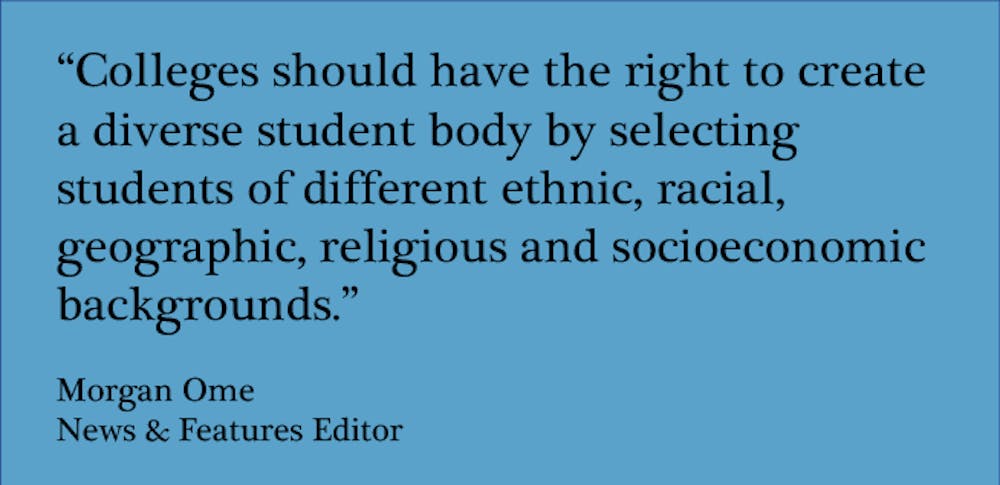As May 1 approaches, high school seniors across the country are making the exciting and difficult decision of where they will spend the next four years of their life. Three years ago, when I was in that same position, I heard some troubling comments about how Asians are held to higher standards than other students.
While I was applying, some told me that since I was Asian, I needed to do exceptionally well on my SATs while other people of color had it easier since they could “play the race card.” When I was rejected from schools, people said, “I guess they just weren’t looking for Asians this year.”
I was recently talking to one of my close friends who, like me, had a handful of schools to choose between. Unlike me, people told her that the primary reason she was admitted to those schools was because she was black.
Reflecting on our different experiences, I’ve wondered: Did race factor into either of our applications and if so, to what extent?
How colleges use race in the admissions process is one of the most divisive issues in America today and is at the core of a current lawsuit against Harvard University.
In 2014, Students for Fair Admissions (SFFA), an anti-affirmative action group, filed a lawsuit alleging that Harvard discriminates against Asian applicants. Earlier this month, a Boston judge set a court date for trial in October, and Harvard agreed to disclose some of its admissions data to the public. The Department of Justice is continuing its own investigation into claims of discrimination.
Edward Blum, the president of SFFA, previously tried to take down affirmative action in the 2013 case Fisher v. University of Texas, in which Abigail Fisher, a white woman who was rejected from the school, alleged that the University of Texas had discriminated against her based on race. The Supreme Court upheld the University’s affirmative action practices.
SFFA claims that Harvard uses “racial quotas” and “racial balancing” to limit the number of Asian students admitted. SFFA has enlisted a number of Asian students who applied to and were rejected from Harvard to support their case, saying that these applicants had higher GPAs and test scores than those of other admitted students.
I sympathize with the students who believe they should have been admitted to Harvard. But opposing policies, like affirmative action, that are designed to increase diversity and help people of color is not the solution.
For much of history, Asian Americans have profited from strides made by minority groups, especially the African-American community. The Civil Rights Movement, for example, directly benefited Asian Americans by legalizing interracial marriage, desegregating schools and housing, and opening up professions that were previously closed off.
Still, many Asian Americans forget this shared history. We see other minority groups as competition. We forget that progress for other minority groups is also progress for Asian Americans. We must understand this. If we do not, we risk becoming pawns in attempts to preserve white power in America.
We’re the perfect tools for anti-affirmative action activists. Many of us have high GPAs, high standardized test scores and a laundry list of extracurricular activities. So when affirmative action is portrayed as prejudice, it seems blatantly wrong to discriminate against highly qualified Asian applicants simply on the basis of race.
But that’s not what is happening. To our knowledge, there is no proof that Harvard is rejecting Asian applicants solely on their race. These applicants may have stellar academic records but still not seem like a good fit for a multitude of other reasons. In addition, Asians as a group apply to colleges in large numbers, which means that large numbers will also be rejected.
Furthermore, colleges should have the right to create a diverse student body by selecting students of different ethnic, racial, geographic, religious and socioeconomic backgrounds. Education does not simply take place within the classroom. It also takes place between peers.
My peers have broadened my worldview and exposed me to experiences that textbooks and lectures cannot: what it’s like to be the child of undocumented immigrants, what it’s like to navigate the world as a queer person, what it’s like to grow up in a biracial family.
These perspectives are invaluable and provide a compelling reason for which colleges should continue to build diverse classes. SFFA supporters say that applicants should not be judged by the color of their skin. At face-value, this argument seems appealing. But it fails to take into account the existing racial hierarchy in America and serves to reify it. We cannot have color-blind or race-blind policies when society at large is still racist.
Morgan Ome is a junior Writing Seminars and Italian major from Hillsborough, Calif. She is a News & Features Editor.





